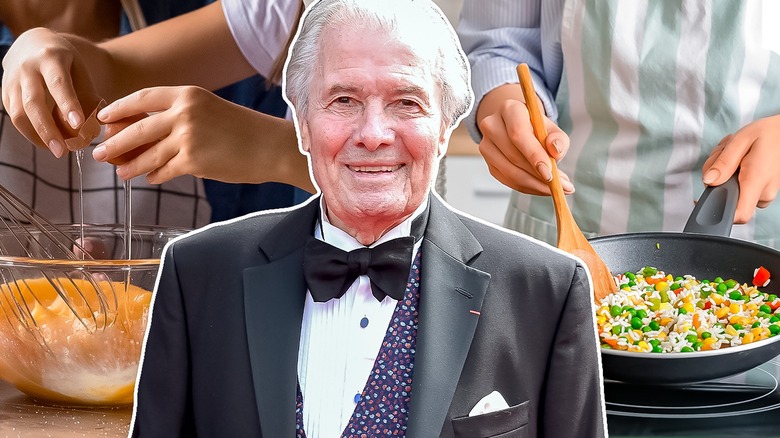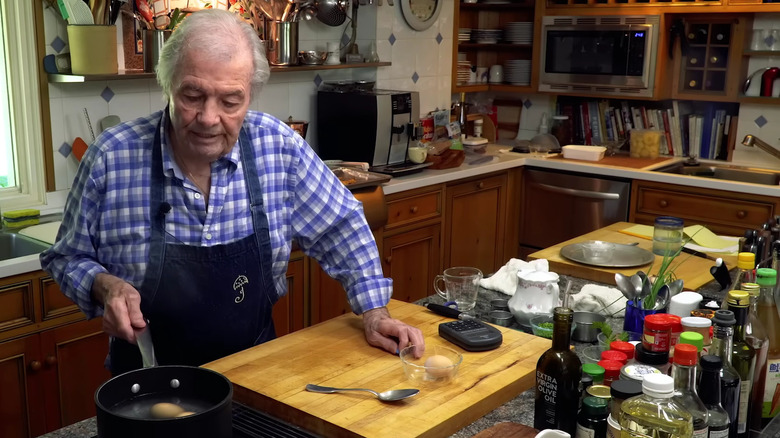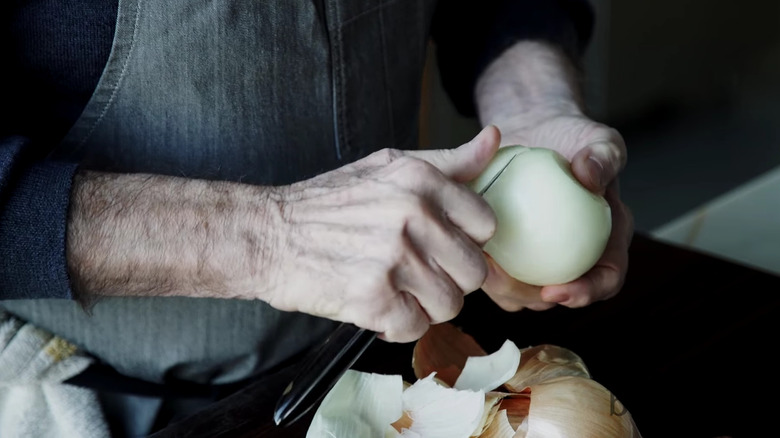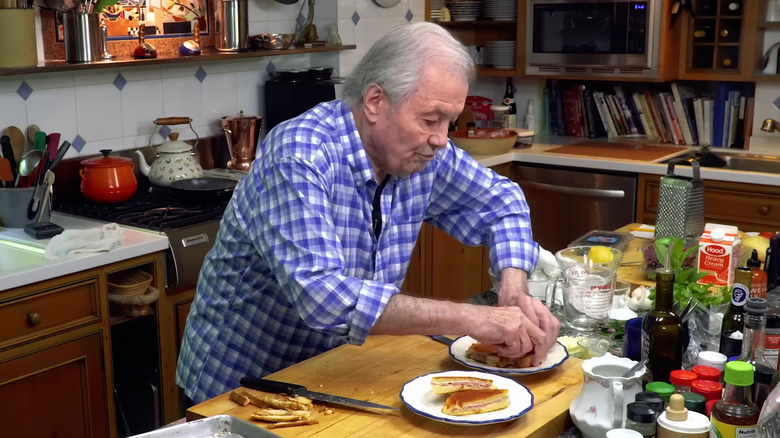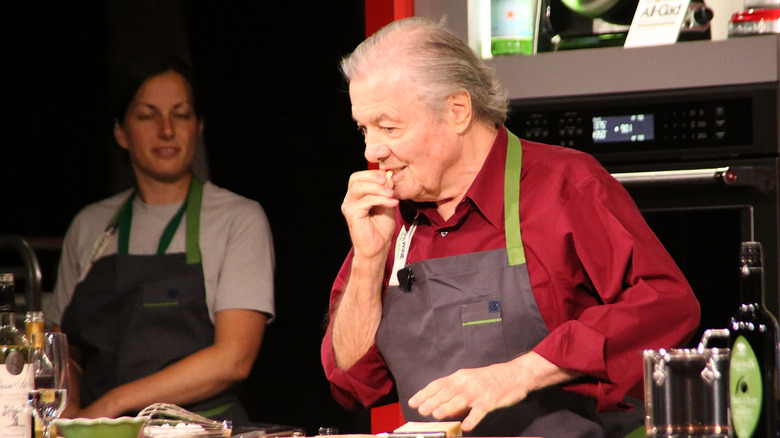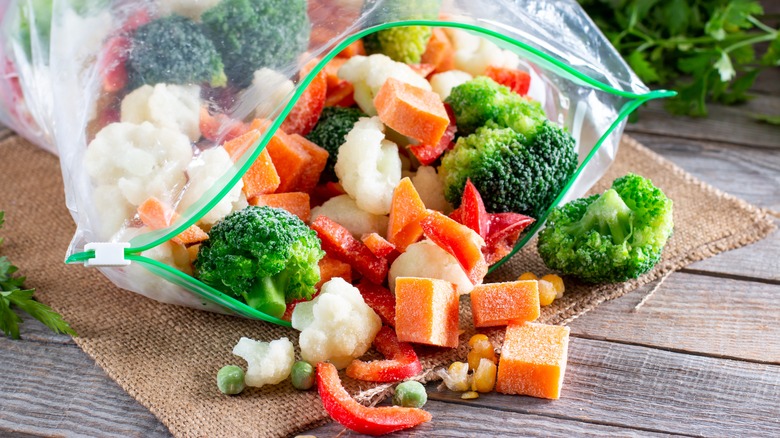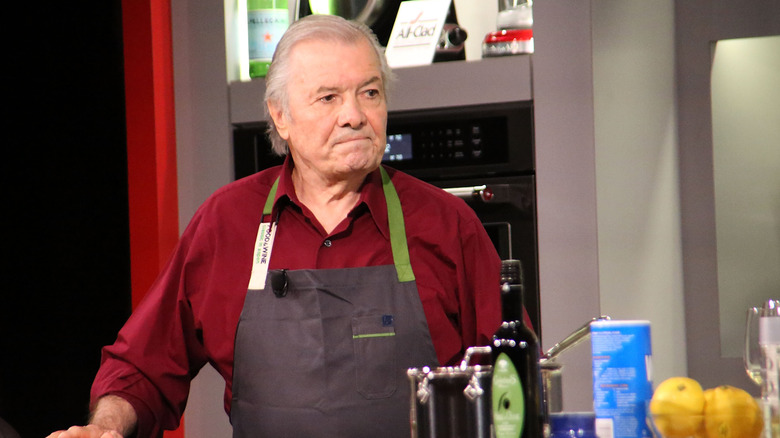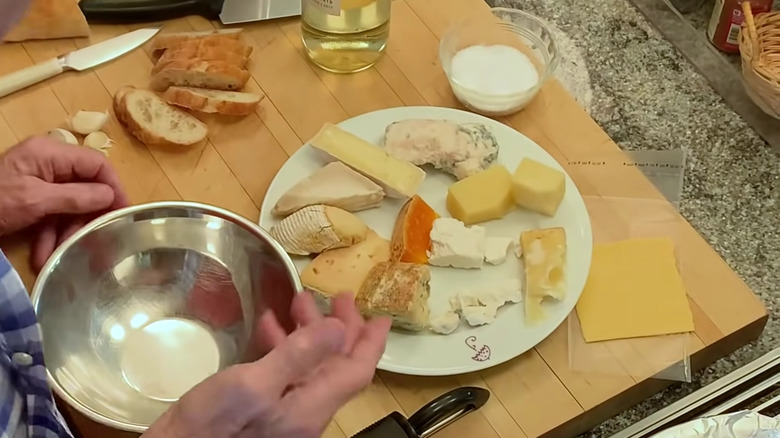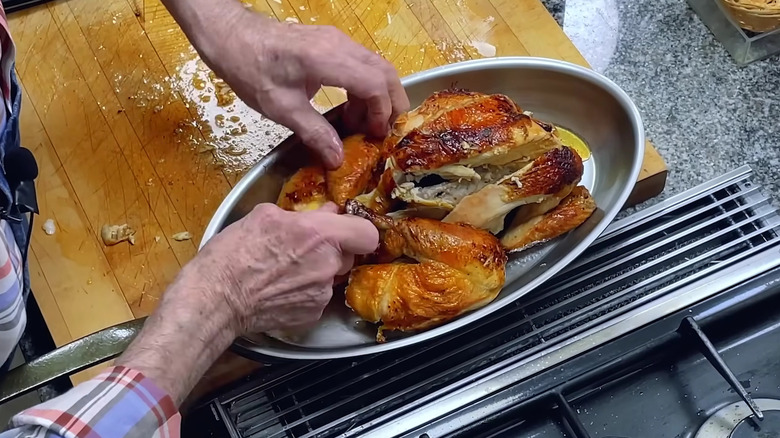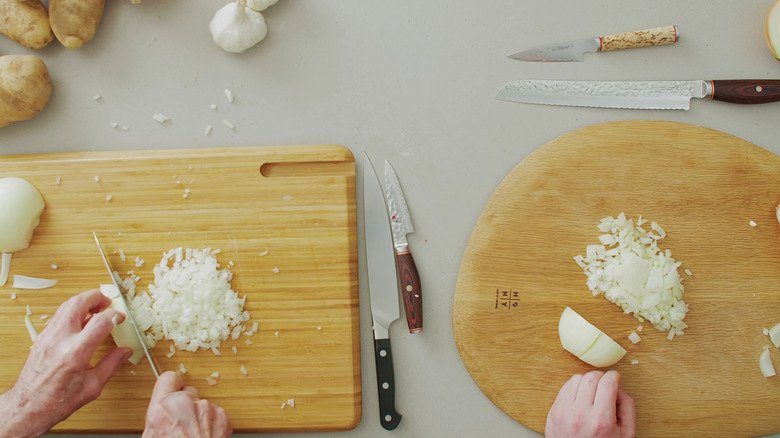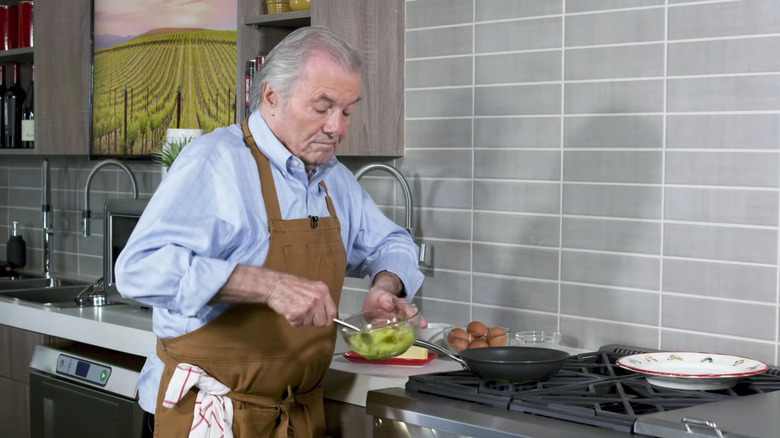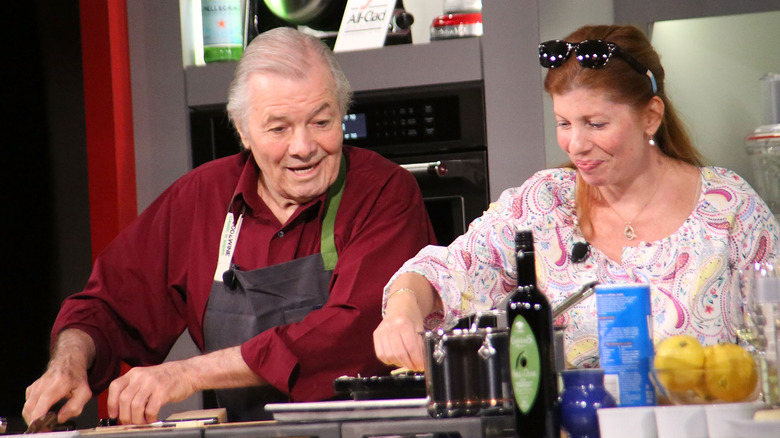Jacques Pépin's 12 Best Tips For Budding Home Chefs
Jacques Pépin is a legendary cook who, amongst many other achievements, has been personal chef to three French heads of state, won a plethora of James Beard Awards, and had over 30 books published. Such successes are staggering, yet they only account for a fraction of Pépin's extraordinary career. The true measure of Pépin's career is not to be found in its innumerable accolades, but in how he has inspired multiple generations of home cooks around the world.
As with many other celebrity chefs of his generation, Pépin did not expect fame from his profession; he expected a life of underappreciated toil. Of course, things didn't turn out that way. Pépin has achieved stardom few living chefs can rival, reaching millions of people through his books and television programs. In both of these mediums, Pépin's cooking advice has been honest, practical, and considered. Such advice has shaped the cooking of millions, including several people who have gone on to become celebrated chefs in their own right.
With that in mind, here are 12 cooking tips from Pépin that are designed to inspire and educate. If you learn to do them Pépin's way, you have learned to do 12 things the way they should be done.
1. Start by cooking something simple
For those who haven't had a lot of practice, the kitchen is an intimidating place. Jacques Pépin believes that getting over these nerves is of paramount importance for a home cook to make any progress. One method of combating nerves that Pépin advocates for is having a glass of wine.
Another is to start cooking something simple. He explained how one might go about the latter when speaking to Forbes: "Start by trying something very simple. Something like what my wife, Gloria, calls Fridge soup. Open the refrigerator and take a look at what you've got. Maybe you've got a half an onion, a zucchini, a couple of carrots. Even some wilted lettuce. Chop it up all up and put it in a stockpot. Add some water and chicken broth. Simmer for 20 or 30 minutes and finish it off with some pasta or couscous. You've got dinner."
Pépin states that this is doubly true when expecting guests: no home cook should attempt something they've never cooked before when hosting. Instead, he advocates for hosts to make something they are familiar with, as this will allow them to relax and thus interact with their guests. Although he has the skill to pull off more, Pépin lives by this creed, cooking simple dishes for himself, his friends, and his family to enjoy.
2. Master basic techniques
In professional circles, Jacques Pépin is known as a master of classic French technique. Pépin summarized his considerable knowledge in his iconic 1976 book "La Technique." This book was groundbreaking in that it included in-depth descriptions of culinary techniques alongside photographs that demonstrated how each was done. "La Technique" proved to be a bible for generations of cooks both professional and amateur.
Today, almost 50 years after "La Technique" was published, Pépin still sings the virtues of learning proper technique for everything from basic cutting mechanics to the way vegetables should be peeled. Speaking to The New York Times Pépin said: "All the great chefs I know — Thomas Keller, Jean-Georges Vongerichten — they are technicians first ... You have no choice as a professional chef: you have to repeat, repeat, repeat, repeat until it becomes part of yourself. I certainly don't cook the same way I did 40 years ago, but the technique remains. And that's what the student needs to learn: the technique."
Fortunately for the home cooks of today, studying proper technique has never been easier. YouTube is full of free videos detailing how to execute every facet of cooking imaginable. Some of the best videos actually involve Pépin himself. That being said, learning new skills takes time and there is no shortcut to manual practice. Just rest assured that the results of your labor will be well worth the effort.
3. Don't overcomplicate dishes
In their eagerness, many cooks continue to add ingredients to a dish long after they should have stopped. The end result is food that is unbalanced and feels forced. This is a particular issue for those just starting out on their cooking journey as these people have yet to learn the power of restraint. Jacques Pépin underscored this in an interview with Bon Appétit: "One of the biggest problems with young chefs is too much addition to the plate. You put cilantro and then tarragon and then olive oil and then walnut oil or whatever. It's too much."
While there is a time and place for impressive garnishes and complex cooking processes, Pépin suggests that most home cooks could benefit from minimizing their ingredients. The use of flavorful, seasonal ingredients that need little embellishment aid massively in adopting this ethos. As Pépin highlights, fresh ripe ingredients like tomatoes often need no more than olive oil and salt to make them sing.
4. Always taste as you cook
This cooking tip is by no means groundbreaking, yet it remains criminally under-employed by those cooking at home. To put it simply, the only way a cook can ensure something tastes good is by trying it and subsequently adjusting it. This is common practice in professional kitchens around the world where chefs not only taste whole dishes, but sample separate components of a dish throughout service to ensure consistency.
Jacques Pépin is a staunch advocate for tasting while cooking, as he told Vice: "As you taste, you adjust. You taste, you adjust. You taste, you adjust, until it's exactly the way it should taste because there is no way that you can have the same chicken with the exact same amount of fat as last night's service. Or today, you're cooking with gas or electric, or copper or aluminum, or it's very humid, or very dry, or you're in a good mood or a bad mood. With all of those tiny changes, you have to adjust so that the recipe always comes out the same."
Replicability is not the only reason cooks should taste their food. They should always be evaluating seasoning, texture, and degree of cooking when tasting, as well, to help them replicate dishes in the future.
5. Don't be embarrassed of shortcuts
In an attempt to feel like "a real cook," many people turn their noses up at simple shortcuts that speed up the cooking process. Frozen vegetables are one such product that has been stigmatized to the point where many home cooks refuse to use them, even though they are nutritious and can save both time and effort.
Jacques Pépin refutes the idea that using convenient products is lazy or somehow inauthentic. Instead, he advocates for them, likening pre-prepped products to using a prep cook at a restaurant. Pépin stated the following in an interview with CT Insider: "When you are in a restaurant you have someone boiling out the chicken and cleaning the spinach and chopping the shallots and skinning the fish. I go to the supermarket [and] they have skinless, boneless breasts of chicken, pre-washed spinach. You can use that as a prep cook and with a minimum amount of time, do a meal, something simpler."
With that in mind, home cooks should be empowered to use the ingredients that suit them and their particular situation best. This will allow all people, regardless of their economic situation, geographic location, or cultural practices to make food that is simple, enjoyable to cook, and flavorful.
6. Focusing on innovation can be detrimental
Once cooks have the basics down, they often start pursuing a means of expressing their own idea of taste. This is by no means a bad thing; cooking, like any art form, is made for personal expression. However, pushing for innovation too early and with too much force can be detrimental.
Jacques Pépin thinks the problem arises when cooks try so hard to create something new that they compromise the food itself. He highlighted this to Wine Spectator: "If you look at the legacy of nouvelle cuisine, the good principles were to buy fresh food, use the best possible ingredients and use new techniques and new equipment. Then, try to be creative and present the food attractively. The latter are the only two things that young chefs remember. ... Often I taste things and say it's very good, but I have no idea what it is. You don't know whether its rabbit or pheasant; it doesn't have any distinctive taste. It's good, but what's the point?" In other words, food's flavor — and not its complexity — should be prioritized.
This is a point readily demonstrated when dining around the world. All too often, complex and extortionate meals served in fancy restaurants are significantly less enjoyable than the simplest, cheapest dishes available. Home cooks would do well to remember this and focus on quality, as opposed to complexity.
7. Frugality is an important part of creativity
As a man that grew up during the scarcity of World War II, Jacques Pépin hates to waste food. While the saving of vegetable peelings and other detritus that are commonly thrown away might seem old-fashioned to some, for Pépin, it's a vital part of the cooking process. This can be seen in many of the cooking videos Pépin made during the coronavirus pandemic lockdowns. In these videos, he frequently incorporates the odd, old mushroom into a recipe, or scrapes the mold from some old cheese, before using it in a dish.
While frugality is less of a necessity in modern-day America than it was in wartime France, cooking in this style is still pertinent. Not only does reducing food waste benefit the planet, but it also aids a chef's creativity. We have already seen how Pépin likes to use leftovers to make fridge soup. He also improves soups by transforming stale bread into breadcrumb toppings. Using tired ingredients in novel ways, like using cheese rinds and vegetable trimmings to make stock, is also creatively freeing. As there is no recipe, you just make do with what you've got. This is a fantastic entrance into mindful, culinary innovation.
8. Don't always follow the recipe
Jacques Pépin has written numerous recipes in his time, yet he has never lost sight of the fact that recipes — while freeing for him to write –can make cooking a very constrictive act for those following them. What's more, home cooks that follow recipes word for word will only develop their skills so far. There is a distinct difference between being an adept recipe follower and a legitimate cook.
Pépin is aware of this, hence why he encourages cooks to slowly wean themselves off his recipes. He explained this approach in an interview with GQ: "When people do one of my recipes, you should always follow it exactly the first time you do it, and if it comes out good and you like it, you can do it again. The second time, maybe you take a fast look. The third time you don't look at it. By the fourth time, you can probably improve the recipe—you think, 'I'm going to put more tomato, and less of that.' And a year later, you don't even know where it comes from—it has become your recipe."
As mentioned previously, the cooking environment, equipment, and ingredients will vary each time you cook a recipe. Cooking in Pépin's independent manner allows cooks to account for this variance in a way that rigid recipe following cannot. This is all the more reason to close the cookbook the next time you make your favorite dish.
9. Cook chicken at high temperatures
The chicken is an integral part of many world cuisines, but it is especially beloved by the French. Within France, there are many regional varieties of chicken. Bourg-en-Bresse, where Jacques Pépin hails from, is famous for its Bresse chickens, one of the most expensive varieties in the world. Because of his upbringing, Pépin has a deep appreciation of chickens. The great chef even wrote an entire book about them titled "Art of the Chicken." Of course, Pépin also celebrates chickens through the proper cooking and eating of them.
Unfortunately, cooking a chicken well is easier said than done. The deceptively complex protein derails many a home cook, as Pépin explained to Tasting Table: "The breast can get dry and overcook pretty fast. One way to cook it to avoid this is to use a very high temperature and let the bird rest or the pieces rest for a while after cooking so that the juice equalizes." When Pépin says hot he means hot; the chicken should be browned in a cast iron skillet before being roasted in a 425-degree Fahrenheit oven.
10. Have three good knives
Like many other notable chefs, Jacques Pépin preaches moderation when it comes to the kitchen equipment, stating that most home cooks only need three different knives. He detailed each of these to GQ: "You need an eight-to-twelve inch cook's knife, a six-inch utility knife, and a paring knife. You don't have to buy the most expensive knives, either; it's more important to make sure they are sized correctly for your hand."
Cost is especially unimportant when it comes to paring knives. These run-of-the-mill blades take such a battering and are so frequently lost that it makes little sense to invest in expensive ones. Notable chef David Chang swears by using a plastic-handled paring knife that usually costs less than $20. In a video on YouTube, Pépin also notes that losing paring knives is an issue. So, if you are looking to splurge on a new knife, your money is better spent on purchasing a high-quality chef's or utility knife.
11. Vigorously mix your eggs when making an omelet
The classic French omelet is often seen as the standard test for quickly evaluating a cook's skill. As an incredibly technical French chef, it is no surprise that Jacques Pépin is a master of the classic omelet. In fact, a video of him making the dish in 1995 has become one of the most celebrated food videos of all time.
The reason why the classic French omelet is seen as a cooking litmus test is that making a good one requires flawless technique to avoid the dish's numerous pitfalls. While many people worry about handling the omelet in the pan, Pépin identifies an earlier mistake that dooms many French omelets to failure before they even begin cooking: not beating the egg vigorously enough. Pépin highlighted this when speaking to The New York Times: "You have to break the whites so that there aren't long strings of the white showing." Uniformity, in both color and texture, is a key characteristic of classic French omelets. As such, vigorously beating the eggs should not be overlooked.
12. Cook with friends and loved ones
Jacques Pépin is a firm believer that food and cooking are pillars of family life. Because of this, Pépin advocates for families and friends to cook together both as a way of creating food and, more importantly, as a means of spending quality time together. He highlighted this to Forbes: "When my daughter Claudine was 1, I held her in my arms and she'd stir the pot. My granddaughter used to pull a stool over to the stove and help me. Those are the kind of visceral memories — the sound of the pots and pans, the smells in the kitchen, going out to the garden to pick parsley and tomatoes — that stay with you for a lifetime."
As Pépin underscored, cooking with children can be especially rewarding. While the supervising adult gets to build cherished memories, the children also benefit through a growing understanding of food and how to cook for themselves. These two takeaways will undoubtedly encourage them to be more adventurous with food and have a healthier relationship with it.
Static Media owns and operates Daily Meal and Tasting Table.
